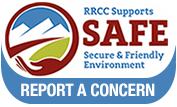Red Rocks Community College Procedure
| Category: | Personnel | ||
| Title: | Employee Grievances (Non-Classified) | ||
| Number: | RRPR 3-50 | Approved: | 05/09/12 |
| Effective: | 05/09/12 | Revised: | 04/13/2022 |
|
|
|||
| Reference: |
Board Policy 3-50, SP 3-50a: Employee Grievances |
||
| Purpose: | In the interest of equitable and efficient operation of Red Rocks Community College (RRCC), employees of the College shall be afforded a mechanism by which grievances can be resolved at the earliest opportunity. | ||
| Scope: |
This procedure applies to Administrator/Professional Technical employee(s), Faculty Adjunct Instructor(s), hourly employee(s), which would include student hourly’s and work-study’s. This procedure shall not apply to College Presidents or Classified employee(s). Classified employee(s) should follow the Department of Personnel Board Rules to file a grievance. https://spb.colorado.gov/forms-and-filing |
||
| Basis: |
The System president shall establish grievance procedures for when a CCCS Employee(s) feels an action(s) violates or inequitably applies Board Policies (BP), System President’s Procedures (SP), or College Procedures and which adversely affects the employee’s working conditions. SP3-50a If the basis of the claim is discrimination and/ or harassment based on federal or state civil rights laws, the student must file a grievance under the Civil Rights Grievance and Investigation Process. If the accused (respondent) is a student, please refer to SP 19-60a. If the respondent is a CCCS Administrator/Professional Technical employee(s), Faculty or Adjunct Instructor(s), Classified employee(s), hourly employee(s), which would include student hourly’s and work-study’s (CCCS employee(s)), authorized volunteer(s), guest(s) or visitor(s), please refer to SP 19-60a. The System President delegates to each College President the responsibility to ensure the grievance procedures are implemented at their college. The System President will be responsible to ensure this procedure is implemented at the CCCS central office for central staff employees. |
||
|
|
|||
| Attachment: |
RRPR – 3-50a - (Appendix) Employee Grievances Incident Report Form |
||
| Definitions: |
Complainant: is a person who is subject to alleged inequity as it applies to Board Policies, System President’s Procedures, or College Procedures. For purposes of this procedure, a complainant is an RRCC Employee, with the exception to classified employees. Classified employees shall follow the grievance procedure established under the State of Colorado Personnel Rules. Respondent: is a person whose alleged conduct is the subject of a complaint. For purposes of this procedure, a respondent can be a CCCS Employee(s), authorized volunteer(s), guest(s), visitor(s), or college. Appointing Authority/Disciplinary Authority: is the individual with the authority or delegated authority to make ultimate personnel decisions concerning a particular employee. A Disciplinary authority is the individual who or office that has the authority or delegated authority to impose discipline upon a particular employee. This individual will be collectively referred to as the “Appointing Authority”. The College President has designated the Director of Human Resources/Title IX Administrator as the appointing authority for the college. Grievable Offenses: Except as noted herein, an employee may grieve any action which violates or inequitably applies Board Policies, System President’s Procedures, or College Procedures and which adversely affects the employee's working conditions. Claims of discrimination and/or harassment based on federal or state civil rights laws are not covered under this procedure. Such claims are processed pursuant to SP 19-60 Civil Rights and Sexual Misconduct Resolution Process.
Nongrievable Matters: The following matters are not grievable under this policy except as noted:
Filing a Complaint: All complaints shall be made as promptly as possible after the occurrence. A delay in reporting may be reasonable under some circumstances; however, an unreasonable delay in reporting is an appropriate consideration in evaluating the merits of a complaint or report. Procedure: Employees must timely submit all grievances in writing (see attachment) to the Director of Human Resources. All grievances shall be assessed by the preponderance of evidence standard. The Director of Human Resources or their designee will be the investigator(s) over the complaint. The investigator(s) shall initially determine whether the complaint is grievable or non-grievable.
Informal Process: Before pursuing a formal complaint process, every reasonable effort should be made to constructively resolve the issues with RRCC employees and students at the informal level. The investigator(s) shall be the facilitator over the informal resolution process. If informal resolution is not successful, the investigator(s) shall open a formal grievance case. Formal Process: The investigator(s) will contact or request a meeting with both the complainant and respondent. Both parties will be given the opportunity to discuss the allegations of the grievance and may offer any documentation, witnesses, or other materials in support of the complaint. During this meeting, neither party may have a representative, including attorneys or law students (legal counsel). The only exception to this rule is if there is civil or criminal action(s) pending specifically related to this grievance, both parties may be represented by legal counsel during these proceedings. Under those limited exceptions, the legal counsel’s role shall be advisory only. The party represented by legal counsel must notify the investigator(s) forty-eight (48) hours in advance of any scheduled meeting so that the investigator(s) can notify the other party. These procedures are entirely administrative in nature and are not considered legal proceedings. No audio or video recording of any kind other than as required by institutional procedure is permitted. The investigator(s) may also contact or request a meeting with relevant college staff, students, or others as part of the investigation. At the investigator’s discretion, the investigator(s) may discontinue meetings with anyone that is causing disruption, and will proceed to make a determination based on the information known at that time. Based on the preponderance of evidence, the investigator shall issue a decision, in writing, to both the complainant and respondent. The decision shall reject or grant the grievance and make recommendation(s) to resolve the issue(s). The complainant and respondent shall be advised of his/her right to appeal the decision, subject to the grounds below, by filing a written appeal with the investigator within seven (7) calendar days of service of the decision. In the event of an appeal, the investigator shall give written notice to the other party to allow him/her the opportunity to submit a response in writing. The investigator will also draft a response memorandum (also shared with all parties). All appeals and responses are then forwarded to the appointed appeals committee for initial review to determine if the appeal meets the limited grounds and is timely. The original finding will stand if the appeal is not timely or substantively eligible, and the decision is final. If the appeal has standing, the documentation is forwarded for consideration. The party requesting appeal must show error as the original finding is presumed to have been decided reasonably and appropriately. The ONLY grounds for appeal are as follows:
If the appeals committee determines that new evidence should be considered, it will return the complaint to the investigator to reconsider in light of the new evidence, only. If the appeals committee determines that a material procedural or substantive error occurred, it may return the complaint to the investigator with instructions to reconvene the hearing to cure the error. In rare cases, where the procedural or substantive error cannot be cured by the investigator in cases of bias, the appeals committee may order a new grievance hearing be held by a different individual acting in the place of the designated investigator. The results of a reconvened hearing cannot be appealed. The results of a new hearing can be appealed, once, on the two applicable grounds for appeals. Special Grievance Process Provisions RRCC as Complainant: As necessary, RRCC reserves the right to initiate a complaint, to serve as complainant, and to initiate conduct proceedings without a formal complaint by the victim of misconduct. Standard of Proof: RRCC will use the preponderance of evidence standard in the grievance proceedings, meaning, RRCC will determine whether it is more likely than not the incident occurred. False Reports: RRCC will not tolerate intentional false reporting of incidents. False reporting could lead to disciplinary action, up to and including termination for employees, and expulsion for students.
False reporting may also be a violation of state criminal statutes and civil defamation laws. The Parties do not have the right to be represented by legal counsel during these proceedings except in the case where civil or criminal actions concerning the grievance are pending and in that case the legal counsel's role shall be advisory only. The party represented by legal counsel must notify the investigator(s) forty-eight (48) hours in advance of any scheduled meeting so that the investigator(s) can notify the other party. Retaliatory Acts: If any person who files a grievance, or any person who testifies, assists or participates in a proceeding, investigation or hearing relating to such grievance, feels they are being subjected to retaliatory acts, they may report such incidences to RRCC Human Resources. It is a violation of this procedure to engage in retaliatory acts against any person who files a grievance or any person who testifies, assists or participates in a grievance proceeding, investigation or hearing relating to such grievance. Such acts will be subject to discipline, up to and including expulsion for students, termination for RRCC employees, and dismissal for authorized volunteers, guests or visitors. Revising this Procedure: Appeal Committees: For faculty, the appeal committee process will follow the peer review process as outlined in BP 3-20. Administrator/Professional Technical (APT) Appeal committees will be comprised of three APT employees to be chosen by the college president in the event that an appeal is filed by the complainant or respondent |
||
|
|
|||









